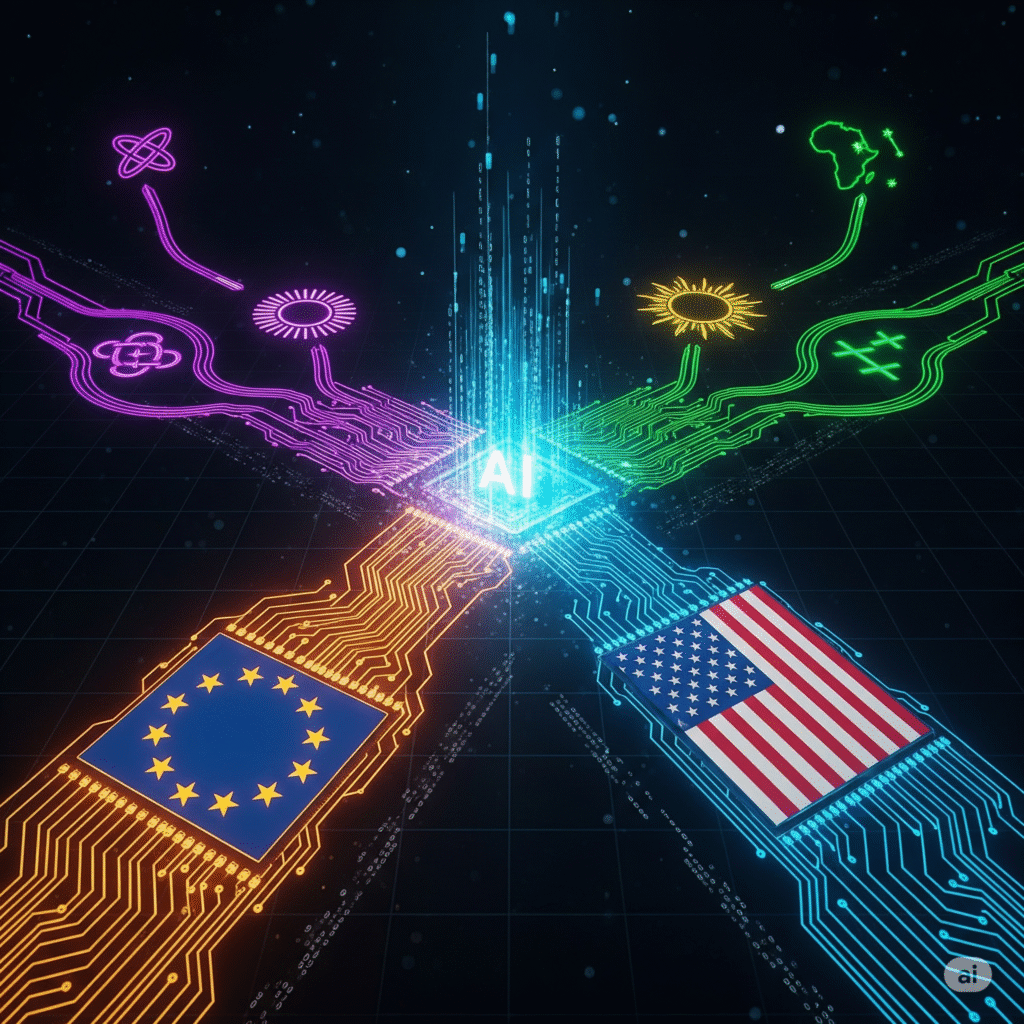By People You Think
Keywords: EU AI Act, U.S. AI policy, AI governance, AI regulation, global AI laws, ethical AI, AI compliance, responsible AI, international AI governance, AI policy 2025
Introduction
Artificial Intelligence is no longer just a technological innovation — it’s now a political and regulatory battleground. As AI becomes central to economies, security, and everyday life, governments worldwide are racing to set the rules.
In this regulatory race, the EU AI Act, evolving U.S. policies, and global governance efforts are shaping the future of AI. The big question: Who will set the global standard for responsible AI?

The EU AI Act: The World’s First Comprehensive AI Law
The European Union AI Act is being hailed as the most ambitious AI regulation in the world.
Key Features
- Risk-Based Classification
- AI systems are categorized into unacceptable risk, high risk, limited risk, and minimal risk.
- High-risk systems (e.g., facial recognition, medical AI) face strict compliance requirements.
- Transparency and Accountability
- Mandatory disclosure when interacting with AI (e.g., chatbots, deepfakes).
- Detailed documentation for training data, bias mitigation, and decision-making processes.
- Penalties for Non-Compliance
- Fines up to €35 million or 7% of global revenue for violations.
SEO Note: The phrase “EU AI Act compliance” is trending in tech policy searches.
U.S. AI Policies: A Sector-Based Approach
Unlike the EU’s sweeping law, the United States is taking a sector-specific, innovation-friendly path.
Core Policy Elements
- Executive Orders and Federal Guidelines
- Emphasis on AI safety, privacy protection, and equity.
- Encouraging public-private partnerships for AI development.
- Sectoral Oversight
- Healthcare, finance, defense, and consumer technology each have their own AI oversight bodies.
- AI Bill of Rights
- A non-binding framework outlining citizen rights in AI interactions.
SEO Tip: Search terms like “U.S. AI regulation 2025” and “AI Bill of Rights explained” are emerging keyword opportunities.
Global AI Governance: Cooperation or Competition?
AI doesn’t stop at borders. Global governance is essential to prevent AI misuse, manage cross-border data, and avoid regulatory conflicts.
Current Initiatives
- UNESCO AI Ethics Recommendations — Guidelines for ethical AI development.
- G7 Hiroshima AI Process — Collaboration among leading economies on AI safety.
- China’s AI Guidelines — Focused on content control, security, and innovation leadership.
SEO Keywords to Watch: “global AI governance,” “international AI law,” and “AI ethics frameworks.”
Challenges in the Regulatory Race
- Regulatory Fragmentation
- Companies face complex compliance costs when operating across jurisdictions.
- Innovation vs. Oversight
- Too much regulation can slow AI research and entrepreneurship.
- Geopolitical Influence
- Nations use AI policy to strengthen global soft power.
Why Businesses Must Act Now
Whether your company operates in Europe, the U.S., or globally, AI compliance is no longer optional.
Action Steps for 2025
- Conduct AI risk assessments.
- Implement bias detection and transparency tools.
- Monitor emerging AI legislation in all target markets.
Final Thoughts
The regulatory race is not just about law — it’s about who will define the ethical and economic rules for AI’s future. The EU AI Act may lead in comprehensiveness, the U.S. in innovation balance, and global governance in diplomacy.
One thing is certain: the winners in AI will be those who innovate responsibly and comply proactively.
Meta Description:
Explore the EU AI Act, U.S. AI policies, and global governance efforts shaping the future of artificial intelligence. Understand what businesses need to know for AI compliance in 2025.
URL Slug:regulatory-race-eu-ai-act-us-policies-global-governance
Image Alt Text Suggestions:
- “EU AI Act policy document”
- “Global AI governance network illustration”










